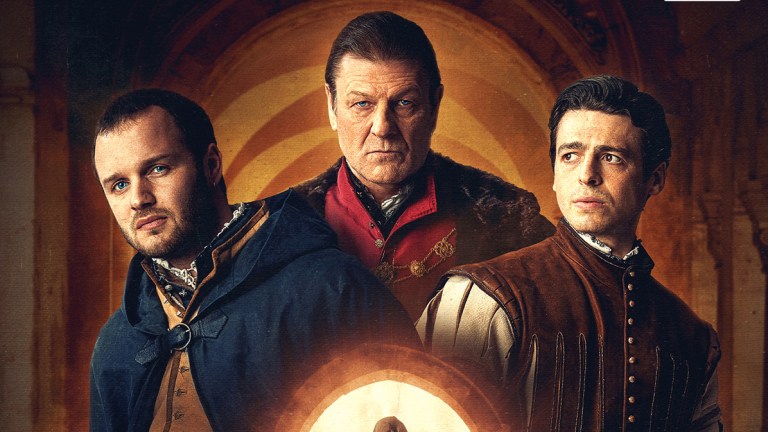Shardlake Review: Sinister and Satisfying Tudor-Set Murder Mystery
Settle in for an atmospheric historical crime drama starring Sean Bean as Thomas Cromwell and Arthur Hughes as Shardlake, ‘The Tudor Morse’.

Out of battery. Out of signal. Stamped underfoot. Dropped into drains. Crime writers have found inventive ways to remove suspense-killing mobile phones from their stories, but no solution is as thorough as CJ Sansom’s. By setting his murder mysteries in Tudor times, Sansom’s 16th century lawyer Matthew Shardlake has to investigate without mobiles, forensics or DNA databases, armed with only his mind and principles. Or rather: his mind, principles, and the fearful reputation of his boss Thomas Cromwell whose name Shardlake draws “like a sword”.
This four-part historical crime drama is adapted from the first of Sansom’s seven Shardlake novels by Stephen Butchard, the writer who so successfully translated Bernard Cornwell’s Saxon Stories to the screen in The Last Kingdom. If it lands well with an audience, there’s hope of many more series, each one a self-contained mystery for ‘the Tudor Morse’ to solve against the backdrop of a rapidly changing England.
The Royal Shakespeare Company’s Arthur Hughes plays Shardlake, with Masters of the Air‘s Anthony Boyle as Cromwell’s henchman Jack Barak, and the mighty Sean Bean as Cromwell himself. Hughes and Boyle make a good double act that feels vibrant and alive, not dusty and far away. Bean brings a grinning leonine menace to Cromwell, who’s clearly as dangerous as the beasts prowling around King Henry VIII’s menagerie at the Tower of London.
It’s well cast, and more authentically so than the proposed but unmade 2007 BBC version with Sir Kenneth Branagh attached to the main role. Like Shardlake, Hughes is disabled and in 2022 was celebrated as the first disabled actor to have played Richard III on stage for the RSC. He was born with radial dysplasia and wears a prosthesis to play Shardlake, a character with scoliosis affecting the shape of his spine.
Shardlake’s disability marks his path through the unenlightened and superstitious Tudor world, which crosses itself as he passes by and gives him cruel nicknames against which he armours himself with intelligence and status. His era’s prejudice isolates him, and in one poignant childhood flashback, is revealed to have changed the whole direction of his life, but – as Hughes has said in interviews – disability is far from the most important part of Shardlake’s character. That’s his conscience as a good, truth-seeking man in a cut-throat world.
The truth Shardlake’s seeking this time is the killer of King Henry VIII‘s commissioner at the (fictional) Sussex monastery of Scarnsea. It’s 1536, mid-Reformation and two years after the Act of Supremacy broke England from Rome. Henry and Cromwell are dissolving the monasteries and divvying up their wealth and lands in the name of “a better England”. Scarnsea’s abbot and its monks are unwilling to sign their home over to the crown, and Shardlake’s job is to find the legal justification to force them. For him, that justification must also be the truth. For Cromwell, the truth is immaterial as long as the monastery falls.
It’s a rich premise from Sansom, a celebrated novelist who sadly passed away after a long illness this month, days before the series was released. The historical setting clearly isn’t just a backdrop, but the real meat of a story about religious corruption and the consequences of shaping ‘the truth’ to a political agenda. The scope here to explore the world as it is, as well as the world as it once was, hasn’t been wasted.
Neither has this sinister, satisfying adaptation wasted any of the novel’s screen potential. Director Justin Chadwick and co. create a claustrophobic, atmospheric setting that transports you to Scarnsea’s wintry cobbles and dark, misty marshlands (actually Hungary and Romania). You’re made to feel the location’s ice and haunting chill, and will come away from a binge-watch with your eyes blinking into the light.
Overall, it’s a satisfying variant of the closed-circle murder mystery with an investigation that unfurls well and at four episodes, doesn’t feel padded – even if it breaks no new genre ground. There’s comfort in its familiarity and in Shardlake’s principled character, and a regular trip back in time to tell the rest of these stories on screen would be a welcome addition to the TV calendar. More, please.
Shardlake is streaming now exclusively on Disney+ in the UK, and on Hulu in the US.
